constituent assembly of india debates (proceedings)- volume vii
constituent assembly of india debates (proceedings)- volume vii
constituent assembly of india debates (proceedings)- volume vii
Create successful ePaper yourself
Turn your PDF publications into a flip-book with our unique Google optimized e-Paper software.
The most outstanding advantage <strong>of</strong> the freedom <strong>of</strong> borrowing is the sense <strong>of</strong> financial responsibility it<br />
creates; for, there is no more accurate, sensitive and dependable meter <strong>of</strong> the credit <strong>of</strong> a borrowing<br />
Government than the reaction <strong>of</strong> the securities market. We do not therefore wish to withdraw this<br />
freedom. Nevertheless, it is necessary to have some machinery which would ensure that borrowing<br />
Governments do not, by their competition, upset the capital market. This machinery is now provided<br />
through the Reserve Bank which advises all the Governments, but in view <strong>of</strong> the ambitious programmes<br />
<strong>of</strong> development both by the Centre and by the Units, it may become necessary to set up some kind <strong>of</strong><br />
expert machinery, both competent and definitely empowered, to fix the order <strong>of</strong> priority <strong>of</strong> the<br />
borrowings <strong>of</strong> the different Governments. In some countries, this co-ordination is effected either by a<br />
Ministerial Conference or by a Loans Council. Such machinery should not affect the responsibility <strong>of</strong> a<br />
Government for its borrowing policy, and should help only in the timing <strong>of</strong> the loan and avoidance <strong>of</strong><br />
unnecessary competition. The co-ordination by the Reserve Bank has worked well in practice and so long<br />
as it works well we do not recommend any change. We assume that there will be no distinction between<br />
federating States and the Provinces in this respect.<br />
82. We are <strong>of</strong> the opinion that it should not be open to a Provincial Government or to a Government<br />
<strong>of</strong> a State to go in for a foreign loan except with the consent <strong>of</strong> the Federal Government and except<br />
under such conditions, if any, as the Federal Government may think fit to impose at the time <strong>of</strong> granting<br />
the consent. We notice, however, that there is an entry, viz., "18. Foreign Loans" in the Federal<br />
Legislative List in the Draft Constitution. We are not sure whether, the insertion <strong>of</strong> this entry in the<br />
Federal Legislative List is enough to prevent the Government <strong>of</strong> a Unit from going in for a foreign loan.<br />
We, therefore, recommend that the point be examined, and if the provision is not found to be adequate,<br />
a specific provision should be made in clause 210 <strong>of</strong> the Draft Constitution making it necessary for the<br />
Government <strong>of</strong> a Unit to obtain the consent <strong>of</strong> the Federal Government before going in for a foreign loan.<br />
Problem <strong>of</strong> Indian States<br />
83. The points at issue are contained in items III, IV, V, VI and XI <strong>of</strong> our terms <strong>of</strong> reference.<br />
This part <strong>of</strong> our work is the most difficult party there<strong>of</strong>, and the difficulty arises as much from the<br />
lack <strong>of</strong> statistical data as from the complications <strong>of</strong> the problem itself; for, not only do conditions differ<br />
widely between the Provinces as a whole and the States as a whole, but from State to State, so that it is<br />
difficult to apply a common yard-stick.<br />
84. The Union Powers Committee <strong>of</strong> the Constituent Assembly in Para 2 (d) <strong>of</strong> their report, dated<br />
17th April, 1947, has expressed its view on this subject in the following terms:--"We realise that, in the<br />
matter <strong>of</strong> industrial development, the States are in varying degrees <strong>of</strong> advancement and conditions in<br />
British India and the States are in many respects dissimilar. Some <strong>of</strong> the above taxes are now regulated<br />
by agreements between the Government <strong>of</strong> India and the States. We, therefore, think that it may not be<br />
possible to impose a uniform standard <strong>of</strong> taxation throughout the Units all at once. We recommend that<br />
uniformity <strong>of</strong> taxation throughout the Units may, for an agreed period <strong>of</strong> years after the establishment <strong>of</strong><br />
the Union not exceeding 15, be kept in abeyance and the incidences, levy, realisation and apportionment<br />
<strong>of</strong> the above taxes in the State Units shall be subjected to agreements between them and the Union<br />
Government. Provision should accordingly be made in the Constitution for implementing the above<br />
recommendation." We entirely agree with these observations.<br />
85. We assume that the ultimate object <strong>of</strong> the Federation must be to secure for the federating States<br />
the same, or nearly the same standards <strong>of</strong> economic development, fiscal arrangements and<br />
administrative efficiency as in the Provinces. It is only against this background that the States can have<br />
the same identity <strong>of</strong> interest with the Union as the Provinces have.<br />
86. The first difficulty met with in our investigation is that many <strong>of</strong> the smaller States have neither a


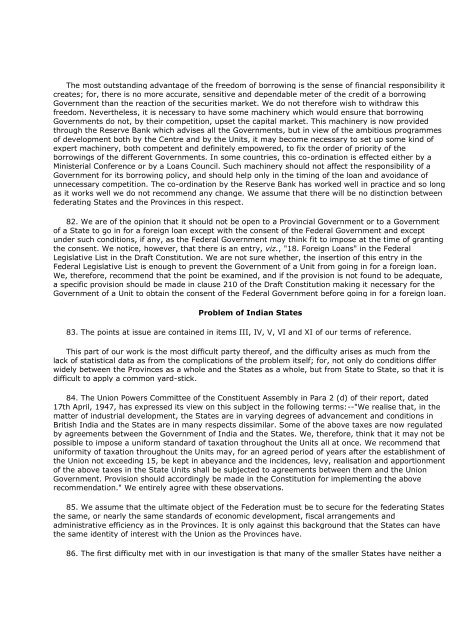
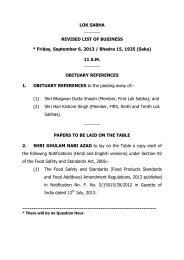
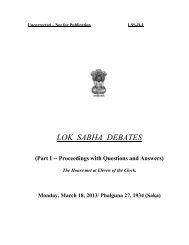
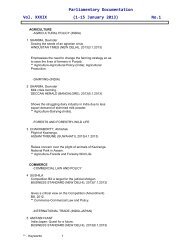
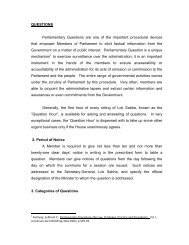
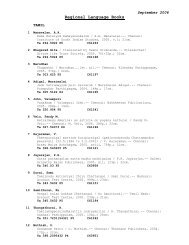
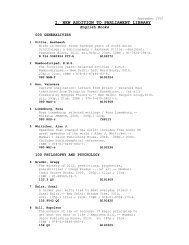
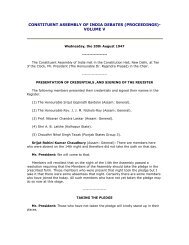
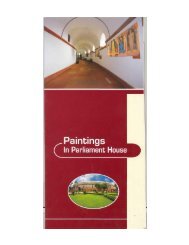
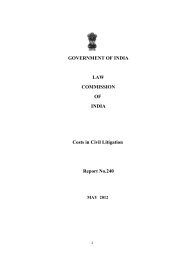
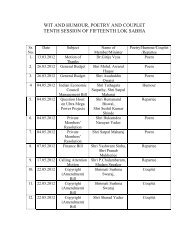
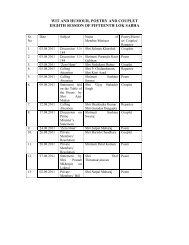

![gÉÉŌ A.]ÉŌ. xÉÉxÉÉ](https://img.yumpu.com/8015720/1/190x245/geeo-aeo-xeexee.jpg?quality=85)
